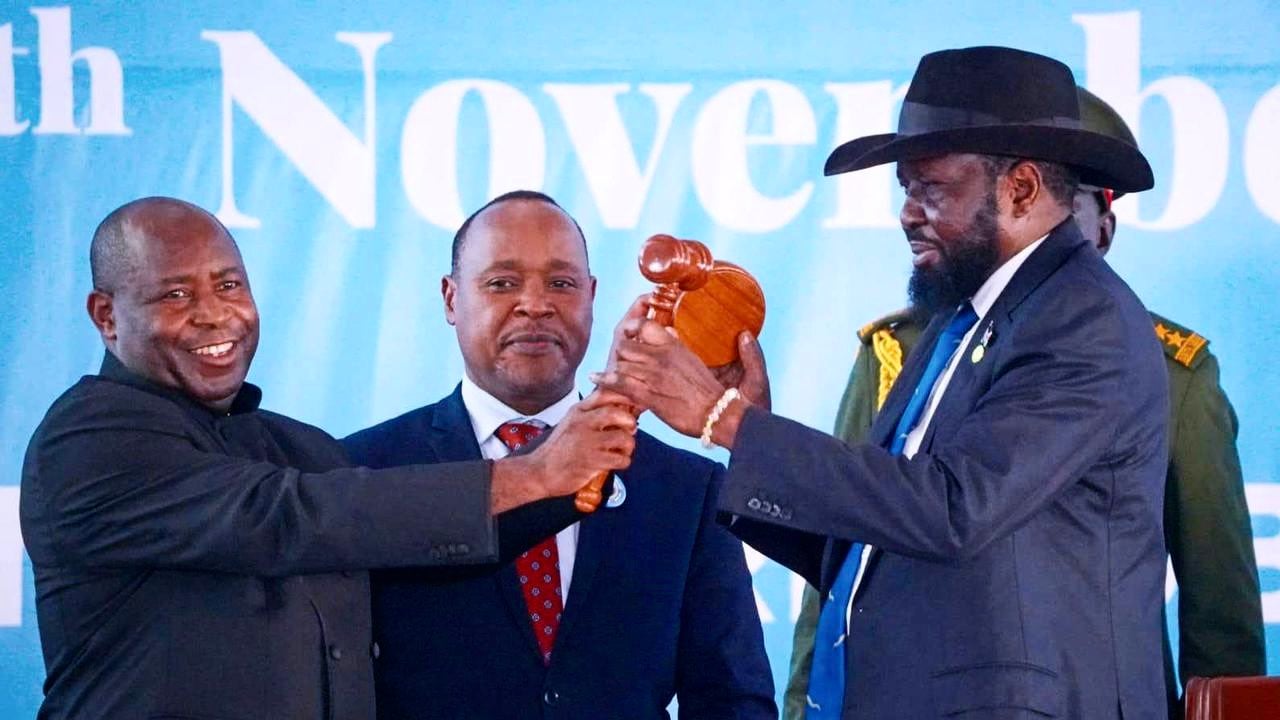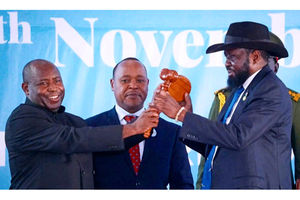
Mama Maria Nyerere having a one on one with Afrika Mashariki Fest Group CEO Dr. Kisembo Ronex Tendo at her Msasani home in Dar es Salaam Tanzania
Twenty-five years inside the East African Community (EAC), the bloc is still toying with the headache of achieving the integration objectives amid growing tensions among member states. The integration objective sets out to facilitate seamless flow of the six freedoms, including movement of goods; persons; labour/workers; services and capital; right of establishment; and right of residence, but this remains a pipe dream.
“Leaders who aren't committed to the implementation of the EAC Treaty's Four Pillars undermine our dream and future. In my view, they're committing treason,” Tendo Kisembo, a Pan Africanist and group chief executive officer at Afrika Mashariki Fest, a Kampala-based think tank, protested on his official X and, for good measure, tagged presidents Museveni (Uganda), Suluhu Samia (Tanzania), William Ruto (Kenya), Paul Kagame (Rwanda), and Salva Kiir South Sudan.
Mr Kisembo’s protest sends signals that there is little political will for EAC leaders to reduce trade protectionism, which is hurting intra-regional trade that dropped from 16 percent in the precious years to 14 percent in recent times.
Free movement of labour across the region has not happened, Denis Kalera, the vice chairman of East African Business Council (EABC), told Saturday Monitor, noting that the biggest impediment has been member states deliberately refusing to recognise mutual recognition agreements, while others have simply not signed them. In September 2018, for one, Vodacom Tanzania announced that the Tanzanian authorities had declined to issue a work permit to a Kenyan to head the operation in Dar es Salaam.
“Today, lawyers from Arusha (Tanzania) here cannot go and start practice in Kigali,” Mr Karera told a recent EABC CEOs-EAC Secretariat roundtable.
Elsewhere, engineers from Kigali cannot build houses in Arusha, Tanzania.
While the EAC bloc also agreed to use national identity cards as travel documents in the region, it is Kenya, Rwanda and Uganda that are allowing the same. As a way forward, the CEO’s roundtable recommended that the region needs to initiate the commencement of negotiations for liberalisation of the remaining non-liberalised five sectors. These include energy, environment, health, construction, recreational and social services.
Sugar ban
EAC sugar millers cannot freely export to Kenya following a ban imposed by authorities in Nairobi despite protests from Kampala traders that the ad hoc decision is against the EAC single market protocol. The protocol allows goods produced from member states to be treated as domestic.
The ban comes at a time Kenya sugar millers reported record high production, averaging between 75,500 and 80,500 metric tonnes (MT) monthly. The numbers exceeded the local consumption by 4,000 MT of sugar. Ugandan millers insist they should be allowed to access the market if not because of the protocol then on account that the pricing and quality of their product has allowed them to build a loyal clientele.
“Kenya is also using permits to restrict entry of eggs and milk products into their domestic market. One of their own, the Ugandan subsidiary of Brookside Dairy, a company associated with the Kenyatta family, has not exported dairy products made in Uganda since March 2023,” Benon Mwangi, the general manager of the Ugandan unit, told Saturday Monitor.
Silver jubilee
Pan Africanists led by Kisembo said they will use the 25 years EAC and the death of Mwalimu Julius Nyerere’s celebrations on October 14, 1999, to seek answers from both policymakers and implementers on the need to facilitate a seamless flow of trade in the bloc. EAC founding First Ladies—Kenya’s Ngina Kenyatta, Uganda’s Miria Obote, and Maria Nyerere—are expected to push the regional integration agenda started by their husbands during the silver jubilee event.
In 1967, Miria Obote, Maria Nyerere and Ngina all witnessed the establishment of the regional bloc. They have since spared no effort to drum up the integration agenda. Ngina, for one, always reminds the leaders that the EAC was built on the understanding that the partner states and its people are stronger together.
Consequently, during the silver jubilee event, African youth are expected to convene for a pilgrimage and dialogue on EAC at Nyerere's ancestral home. They will mull over the Tanzanian statesman’s belief that "Without unity, there is no future for Africa." Nyerere’s powerful words resonate more urgently than ever. Mr Kisembo opines that “this is not just a commemoration but a moment to reflect on our collective journey and the responsibilities we shoulder as leaders, citizens, and custodians of Mwalimu’s legacy.”
Single currency
The EAC Pilgrimages are also going to seek answers as to why EAC leaders are hesitating to aggressively pursue a single currency that could facilitate intra-regional trade. They will also demand to know why Kiswahili, a language that could unify the EAC’s diverse cultures, is not being promoted with the vigour it deserves.
There is also growing criticism about the EAC’s ambitious expansion agenda from three to now eight partner states, which is blamed for dragging the momentum of the integration agenda down. Critics contend that each of the new partner states comes with a lot of "baggage" and entitlements that are gradually derailing the integration process.
“The unrest in the DRC (Democratic Republic of the Congo), South Sudan, and Somalia is not just a failure of national governments; it is a failure of the EAC as a collective. Yet when EAC sent its peacekeeping force, they were expelled by the DRC in favour of South Africa Development Community forces is a damning indictment of our leadership,” Kisembo noted.
Despite the challenges, information from the Centre for Strategic and International Studies has named the EAC as an economic bloc which offers a lot of opportunities, albeit with a lot of political problems in terms of integration.




